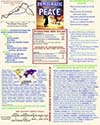 A martyr to freedom. Born in 1982, her full name was Neda Agha-Soltan. She was shot and killed by a basiji riding by on a motorcycle. She is buried at Behesht Zahra cemetery in Tehran (Source)
A martyr to freedom. Born in 1982, her full name was Neda Agha-Soltan. She was shot and killed by a basiji riding by on a motorcycle. She is buried at Behesht Zahra cemetery in Tehran (Source)
Neda alive. (source)
Tectonic earthquakes occur because the earth’s many tectonic plates move in relation to each other, not smoothly, but in fits and starts. Where there is contact between these plates, there may be long periods where friction holds the plates still. Then as the force for their movements builds up, it eventually overcomes the friction, and the plates suddenly jump to a new balance between friction and potential movement. The earth is still, apparently solid, until the friction gives way and we have an earthquake.
Social affairs often follow this pattern, particularly revolutions (and war). There is usually a long period in which a people's desire for change, such as for greater freedom, builds up over time. Sociopolitical dissatisfaction and tension grow, and eventually can be felt in the air. And then something occurs that crystallizes the discontent, and triggers a mass uprising. Such was the case with Iran in 1979 when Ayatollah Khomeini and his Mullahs overthrew Shah Pahlavi's monarchy to create an Islamic republic. Since then, Iranians have become increasingly dissatisfied over their lack of freedom, democracy, and over the Mullah's enforcement of Sharia—Islamic law -- a totalitarian legal system which governs the most personal and intimate behavior.
Thus, Iran was ready for a trigger event. There was in Iran, as among all people, a natural reluctance to endanger oneself and one's loved ones, to risk prison, torture, and death. This was the friction that prevented large scale protests and demonstrations until now. The reelection of incumbent Mahmoud Ahmadinejad was the context. A blatantly stolen election provided the trigger. And the people’s dissatisfaction turned into trembling outrage at this final injustice. They have turned on their authoritarian government with a massive outpouring of protests—a sociopolitical earthquake— not simply over the election fraud, but more profoundly, at their lack of freedom.
Links of Day
Robin Wright, the author of "Dreams and Shadows: The Future of the Middle East," has been covering Iran since 1973. She is a scholar at the Woodrow Wilson International Center for Scholars in Washington."Freedom craving 'fuelling Iran unrest'"
And then there is Obama's terribly weak response. So, let us consider his world by Victor Davis Hanson
"Obamaworld"
Victor Davis Hanson is a classicist and historian at the Hoover Institution at Stanford University and author, most recently, of "A War Like No Other: How the Athenians and Spartans Fought the Peloponnesian War."















No comments:
Post a Comment